How often do orcas attack humans?

- Oops!Something went wrong.Please try again later.
- Oops!Something went wrong.Please try again later.
Captain Robert Falcon Scott witnessed an extraordinary scene during his ill-fated Antarctic expedition when, on Jan. 5, 1911, his photographer Herbert Ponting ran to the edge of an ice floe to photograph a group of orcas that had taken an interest in the expedition dogs tied up on the ice.
"The next moment the whole floe under him and the dogs heaved up and split into fragments," Scott wrote in his diary. "One could hear the 'booming' noise as the whales rose under the ice and struck it with their backs."
Ponting and the dogs escaped the ice unharmed, but the encounter helped cement orcas' (Orcinus orca) terrifying reputation. More than 100 years later, that reputation continues to grow as the species sinks boats off Europe's Iberian coast and targets vessels as far away as Scotland. But how often do orcas actually attack humans?
Turns out, while orcas may deserve their fearsome reputation when it comes to other marine animals, they almost never attack humans in the wild — although they have attacked and killed humans multiple times in captivity. Furthermore, all of the reported violent interactions between orcas and humans come with significant caveats.
Related: TK Sascha's Orca feature about orcas getting smarter
Erich Hoyt, a researcher at Whale and Dolphin Conservation and author of "Orca: The Whale Called Killer" (Firefly Books, 2019), spoke to Live Science about some of the reported orca attacks. His take on the Antarctic incident is that the orcas probably mistook Ponting and the dogs for strange seals.
"Killer whales have been shown to rock ice floes, wash the seals off the floes and break ice from beneath," Hoyt said in an email. "I think yes that was hunting behavior, but not hunting for humans."
Orcas have been encountering humans in the ocean for centuries, and while there's a handful of accounts like Ponting's, there's only one report of the species killing a human. The fatal encounter reportedly happened in the 1950s, when some orcas became trapped in sea ice in the eastern Canadian Arctic.
Two Igloolik Inuit elders told researchers decades later that a young man ignored the advice of his elders and went to see the trapped killer whales. He was warned the ice was too thin, but he believed he could outrun the orcas. According to the elders, an orca broke through the thin ice and ate him.
It's a cautionary tale that the researchers couldn't verify when they reported it as part of a 2014 study in the journal Aquatic Mammals. Hoyt thinks that falling into icy water is a more likely cause of the man's death.
"I don’t think a killer whale would ever hunt a human," Hoyt said. "They are fussy eaters, really conservative in terms of whatever they learned from their mothers and from their pod about what constitutes food."
In other words, orcas don't eat what they aren't taught to eat, so they wouldn't eat a human. Wild orcas sometimes kill other animals for practice or even play, but humans have seemingly never been on the receiving end of this. There's one confirmed case of a killer whale biting a surfer off California in 1972, but the orca quickly let go, the Lodi News-Sentinel newspaper reported in 1996. Hoyt interviewed the surfer and noted he might well have looked like a seal to the orca at the time.
Captive killers

Over the past several decades, there have been dozens of violent encounters between humans and orcas held in captivity. Perhaps most famously, an orca named Tilikum was involved in the deaths of three people, including killing SeaWorld trainer Dawn Brancheau in 2010.
Scientists aren't sure exactly what triggers captive orcas to attack. However, Hoyt noted that captivity is an artificial environment and compared it to living in a tiny jail cell. "After a few years, even in the least oppressive institutions, orcas start to go a bit crazy," Hoyt said.
RELATED STORIES
—'An enormous mass of flesh armed with teeth': How orcas gained their 'killer' reputation
—Scientists investigate mysterious case of orca that swallowed 7 sea otters whole
That doesn't necessarily mean captive orcas kill out of frustration. Hoyt said that the incidents involving Tilikum could have just been attempts at play in the face of extreme boredom.
"In fact, it is amazing how careful killer whales are in the underwater interactions that have been experienced in the wild or captivity," Hoyt said. "Because in most cases unless great care were taken, the orca could easily accidentally kill a human."

